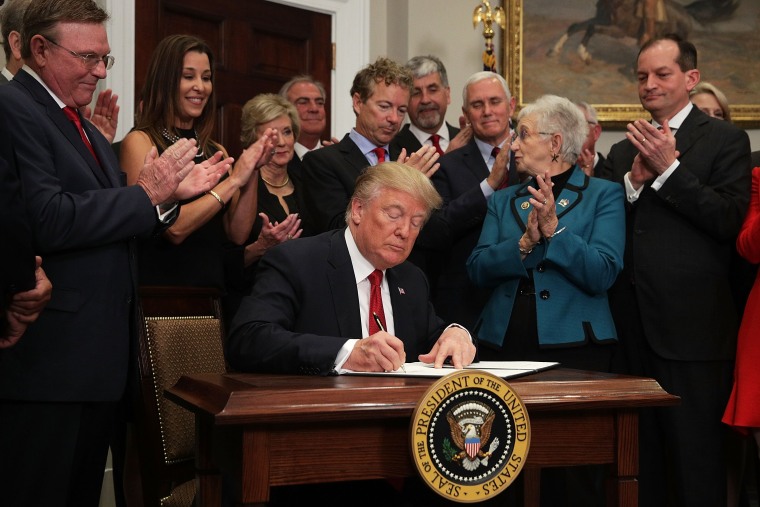During a confirmation hearing in November, Alex Azar, Donald Trump's choice to lead the Department of Health and Human Services, said he hadn't seen "any effort to sabotage" the Affordable Care Act. Perhaps he hasn't looked closely enough.
Because by any fair assessment, the Republican White House has gone to outrageous lengths to undermine "Obamacare," and those efforts took another damaging step yesterday. The New York Times reported:
The Trump administration on Thursday proposed sweeping new rules that could make it easier for small businesses to band together and create health insurance plans that would be exempt from many of the consumer protections mandated by the Affordable Care Act. [...]The proposal would allow small business owners, their employees, sole proprietors and other self-employed people to join together as a single group to buy insurance in the large-group market. The new health plans could be exempt from some requirements of the Affordable Care Act. They would, for example, not have to provide certain “essential health benefits” like mental health care, emergency services, maternity and newborn care and prescription drugs.
We certainly had a sense this was coming. Last week, Trump sat down with a Times reporter and rambled incoherently about "associations," and now we have a better idea what he was talking about.
Let's review what this is all about, because the consequences are likely to be pretty significant.
Under the current law, the Affordable Care Act establishes a series of standards private insurers have to meet in order to qualify for exchange marketplaces. For the right, this is a problem: by making coverage better, the law also makes coverage more expensive.
And so Trump is trying to do the opposite: expand access to worse coverage – what’s often referred to as “skimpy” plans – at a lower cost. As a recent New York Times’ report explained, the administration is moving forward with plans to “develop rules that would expand access to less expensive, less comprehensive insurance, including policies that could be sold by trade associations to their members and short-term medical coverage that could be offered by commercial insurers to individuals and families.”
This insurance will be exempt from the ACA’s safeguards, and not surprisingly, the plans will offer those who buy the coverage far less. Indeed, these plans won’t even have guaranteed essential health benefits or protections for those with pre-existing conditions – which happen to be the most popular parts of “Obamacare.”
At first blush, the idea may not sound like much of a problem. If some consumers want to buy bad and/or cheap insurance, that’ll just affect them, right? Wrong. Many in the industry believe younger and healthier people will gravitate to these low-cost, low-coverage plans because the insurance is cheap and these folks aren’t as worried about their health.
But then the ripple effect kicks in: older and less-healthy consumers will end up having to pay more once younger and healthier consumers have their own cheaper/worse alternative. The result means higher costs for those who need care most and vastly less market stability. In other words, Trump is trying to create a problem that the ACA was designed to avoid.
In an unfortunate twist, TPM noted that the Trump administration, when making yesterday's announcement, said that the Affordable Care Act's individual mandate should mitigate the changes and help stabilize the market. That might be true -- if only Trump and congressional Republicans hadn't repealed the ACA's individual mandate.
There are some unanswered questions here, which is why you may have noticed I haven’t mentioned any specific numbers. Until we know the details of as-yet-unwritten federal rules, we can’t say with certainty how widespread the impact of this change will be. What’s more, it’s a safe bet there will be more than a few lawsuits once the administration’s new approach is ready to go.
That said, it’s not too early to say Trump's sabotage campaign has reached a new level.
Postscript: As we discussed in October, the politics of health care isn’t nearly as significant as the policy implications, but as long as we’re on the subject, today helps mark the shift from “Obamacare” to “Trumpcare.” If, as expected, Trump’s policies leave millions of Americans worse off – or in a worst-case scenario, actually crashes the individual market – it’ll be too late for Republicans to say, “Obama did it.”
Trump is taking ownership of the system he’s making worse. The results will be on him and no one else.
